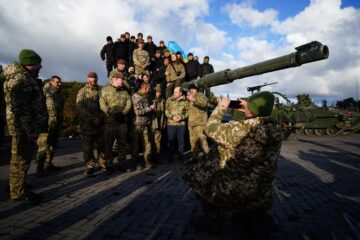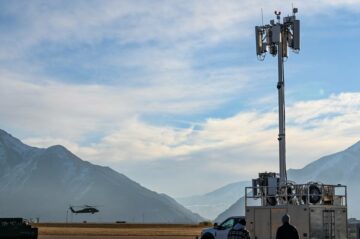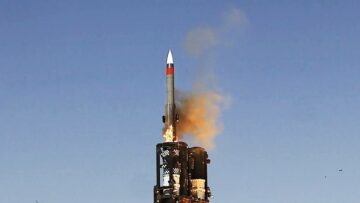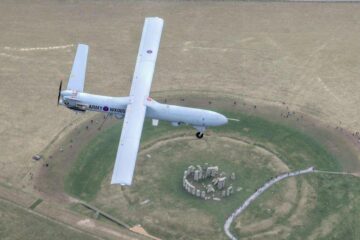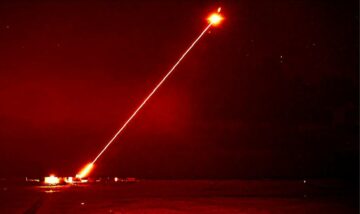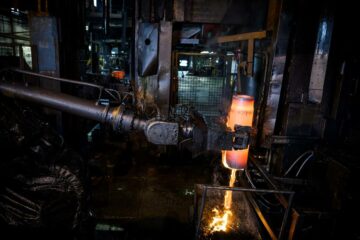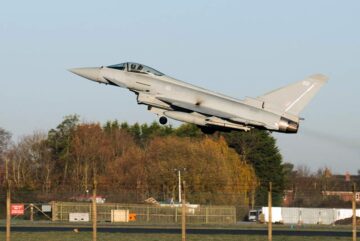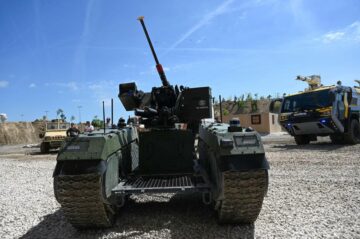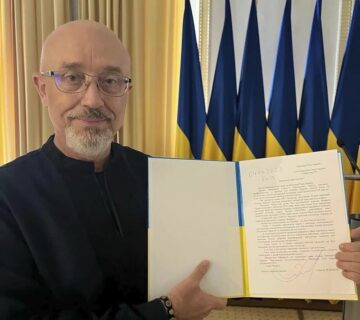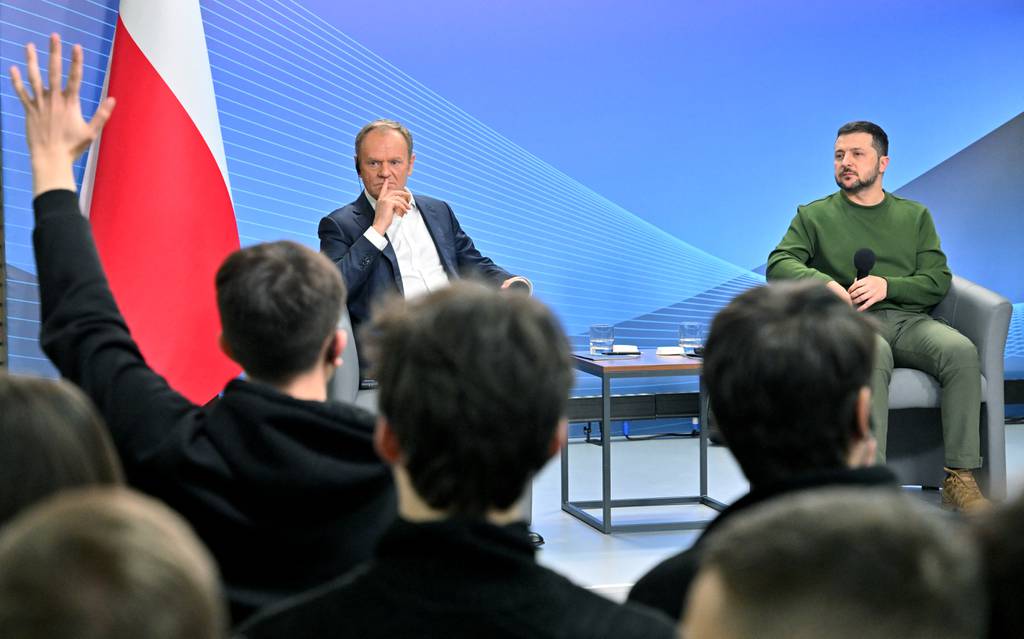
WARSAW, Poland — Sworn into office in December, Polish Prime Minister Donald Tusk said he will overhaul his country’s relations with both Ukraine and the European Union, a shift that could help Poland spearhead further Western-driven armament of the Ukrainian military against the ongoing Russian invasion.
Tusk developed his international credentials as president of the European Council between 2014 and 2019. Since taking office, he has vowed to drum up support for supplying arms and equipment to Poland’s war-torn neighbor.
Under his rule, the nation will also attempt to influence more reluctant countries from the region like Hungary, whose prime minister initially blocked the EU’s plan to provide a €50 billion (U.S. $54.2 billion) aid package to Ukraine.
“I will … demand a full mobilization of the free world, the Western world, to help Ukraine in this war. There is no alternative to such thinking,” Tusk said at the Sejm, a chamber of Poland’s parliament, on Dec. 12, one day before we was sworn into office.
“I can’t listen to some politicians — European but also from other Western countries — who talk about being tired with the situation in Ukraine,” he added, referring to a sense of fatigue that has begun to creep into the political discourse of some of Kyiv’s allies.
Ever since Russia launched a full-scale invasion of Ukraine in February 2022, Poland has established itself as one of Ukraine’s firmest allies, delivering tanks, armored vehicles, howitzers, fighter jets and other types of gear. However, in the months preceding Poland’s Oct. 15 general election, which ousted the Law and Justice party from government and paved the way for Tusk’s new Cabinet, the bilateral relationship has turned sour.
What began as a clash over an extended Polish ban on Ukrainian grain imports eventually seeped into defense cooperation, leading then-Prime Minister Mateusz Morawiecki to halt arms deliveries and focus on upgrading the Polish military instead.
As Tusk hopes to reinvigorate Western military aid to Ukraine, his government will need to reposition itself closer to the decision-making process in Brussels where both the EU and NATO are based, local analysts say.
Polish Defence Minister Władysław Kosiniak-Kamysz has already announced that deepening cooperation with allies would be a priority.
“I want to declare that … we will build the strongest possible position within the structures that guarantee our national security,” the minister said, referring to Warsaw’s position as an EU and NATO member.
Tomasz Smura, head of the research office of the Warsaw-based Casimir Pulaski Foundation, told Defense News he expects relations with Ukraine to improve under the new government. For example, Poland could act as something of an adviser to Ukraine in shedding Soviet-era weapons while adopting Western technology, having gone through the same process, Smura said.
“Poland could use its experience of operating F-16 fighters, helping Ukraine’s Air Force with logistics and training. The aircraft that are going to be delivered to Ukraine could be serviced by Polish plants,” Smura said. “Poland still has some older tanks and armored vehicles we could donate to Ukraine, but we are gradually depleting our stock. The Ukrainian military is now switching to Western technology anyway, and we can assist in this process.”
The expert said Poland can also encourage its EU partners to deliver on commitments the bloc already made to Ukraine’s wartime effort.
“The EU promised to deliver 1 million artillery shells to Ukraine by this March, and it seems we will fall short of this goal. Poland can support Ukraine by continuing to increase its own manufacturing capacities,” Smura added. “Russia has transformed its economy into a war machine and produces a significantly higher volume of ammunition compared with the prewar period. We need to match this growth.”
Jaroslaw Adamowski is the Poland correspondent for Defense News.
- SEO Powered Content & PR Distribution. Get Amplified Today.
- PlatoData.Network Vertical Generative Ai. Empower Yourself. Access Here.
- PlatoAiStream. Web3 Intelligence. Knowledge Amplified. Access Here.
- PlatoESG. Carbon, CleanTech, Energy, Environment, Solar, Waste Management. Access Here.
- PlatoHealth. Biotech and Clinical Trials Intelligence. Access Here.
- Source: https://www.defensenews.com/global/europe/2024/02/12/polands-new-government-eyes-role-as-eu-ukraine-middleman/
- :has
- :is
- :where
- $UP
- 1
- 12
- 15%
- 2%
- 2014
- 2019
- 2022
- 5
- 70
- a
- About
- Act
- added
- Adopting
- adviser
- against
- Aid
- AIR
- Air Force
- aircraft
- already
- also
- alternative
- ammunition
- an
- Analysts
- and
- announced
- anyway
- ARE
- arms
- AS
- assist
- At
- attempt
- Ban
- based
- BE
- before
- began
- begun
- being
- between
- Billion
- bloc
- blocked
- both
- Brussels
- build
- but
- by
- cabinet
- CAN
- capacities
- Chamber
- Clash
- closer
- commitments
- compared
- continuing
- cooperation
- could
- Council
- countries
- country’s
- Credentials
- day
- December
- Decision Making
- defence
- Defense
- deliver
- delivered
- Deliveries
- delivering
- Demand
- depleting
- developed
- discourse
- donald
- donate
- drum
- economy
- effort
- Election
- encourage
- equipment
- established
- EU
- European
- european union
- eventually
- example
- expects
- experience
- expert
- extended
- Eyes
- Fall
- fatigue
- February
- fighters
- Focus
- For
- Force
- Foundation
- Free
- from
- full
- full-scale
- further
- Gear
- General
- goal
- going
- gone
- Government
- gradually
- Growth
- guarantee
- having
- he
- head
- help
- helping
- higher
- his
- hopes
- However
- HTTPS
- Hungary
- images
- imports
- improve
- in
- Increase
- influence
- initially
- instead
- International
- into
- invasion
- IT
- ITS
- itself
- Jets
- jpg
- Justice
- launched
- Law
- leading
- like
- listen
- local
- logistics
- machine
- made
- manufacturing
- March
- Match
- member
- Military
- million
- minister
- mobilization
- months
- more
- nation
- National
- national security
- Need
- New
- news
- no
- now
- Oct
- of
- Office
- older
- on
- ONE
- ongoing
- operating
- Other
- our
- over
- Overhaul
- own
- package
- parliament
- partners
- party
- paved
- period
- plan
- plants
- plato
- Plato Data Intelligence
- PlatoData
- Poland
- Polish
- political
- Politicians
- position
- possible
- president
- Prime
- prime minister
- priority
- process
- produces
- promised
- provide
- referring
- region
- relations
- relationship
- research
- Role
- Rule
- Russia
- russian
- s
- Said
- same
- say
- security
- seems
- sense
- shift
- Short
- significantly
- since
- situation
- some
- something
- spearhead
- Still
- stock
- strongest
- structures
- such
- supplying
- support
- taking
- Talk
- Tanks
- Technology
- that
- The
- the Law
- There.
- Thinking
- this
- Through
- tired
- to
- told
- Training
- transformed
- Turned
- tusk
- types
- u.s.
- Ukraine
- Ukraines
- Ukrainian
- under
- union
- use
- Vehicles
- volume
- want
- war
- was
- Way..
- we
- Western
- Western World
- which
- while
- WHO
- whose
- will
- with
- within
- world
- would
- zephyrnet


